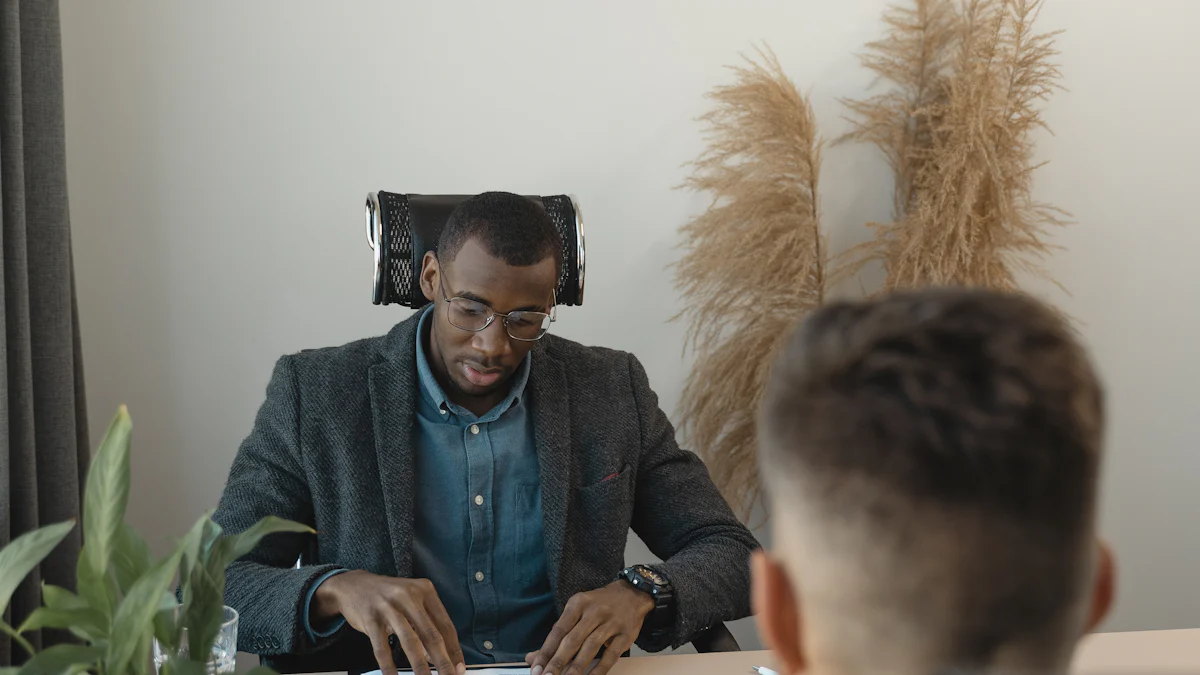Tips to Answer the Biggest Weakness Interview Question
Try Aihirely for
Smarter Interview Prep
Experience real-time AI support tailored to your Resume.
Boost your confidence and ace every question with
AI Mock Interview.

Image Source: pexels
Answering the biggest weakness interview question can feel tricky, right? You might worry about saying the wrong thing or sounding unprepared. But here’s the good news: this question gives you a chance to show self-awareness and growth. With the right approach, your answer can actually impress the interviewer and boost your confidence.
Key Takeaways
-
Be truthful about your weaknesses. Admitting them shows you understand yourself.
-
Talk about your weakness in a good way. Share how you are working to get better.
-
Don’t use common phrases or harsh words. Pick a real weakness that won’t hurt your chances and explain how you’re fixing it.
Why Interviewers Ask the Biggest Weakness Interview Question
The purpose behind the question
You might wonder why interviewers even ask about weaknesses. It’s not because they want to trip you up or make you feel uncomfortable. Instead, they’re trying to understand you better as a candidate. This question helps them see how self-aware you are and whether you can reflect on your own areas for improvement.
Think about it—if someone claims they have no weaknesses, it can come across as dishonest or out of touch. Everyone has something they’re working on, and acknowledging that shows maturity. Plus, interviewers want to know if you’ll need extra training or support in certain areas once you’re hired. It’s not a bad thing; it’s just part of making sure you’re set up for success in the role.
What interviewers want to learn from your response
When you answer the biggest weakness interview question, interviewers are looking for a few key things. First, they want to see if you’re honest. Are you willing to admit that you’re not perfect? That’s a good sign because it shows you’re grounded and realistic.
Second, they’re checking how you handle challenges. Do you take steps to improve yourself, or do you ignore your weaknesses? Sharing how you’re actively working on your growth can leave a strong impression.
Finally, they’re assessing how your weakness might impact the job. If your weakness is something critical to the role, it could raise concerns. But if it’s a minor issue or something you’re already improving, it shows you’re proactive and committed to getting better.
Tip: Frame your answer in a way that highlights your growth. Show the interviewer that you’re not just aware of your weakness but also taking steps to overcome it.
Common Mistakes to Avoid When Answering
Being overly negative or self-critical
It’s easy to fall into the trap of being too hard on yourself when answering the biggest weakness interview question. You might think that being brutally honest will make you seem authentic, but it can actually backfire. For example, if you focus too much on your flaws without offering any solutions, you risk leaving the interviewer with a negative impression. Instead, keep your answer balanced. Acknowledge your weakness, but don’t dwell on it. Shift the focus to how you’re working to improve.
Pro Tip: Avoid using language that sounds overly harsh, like “I’m terrible at…” or “I always fail at…” It’s okay to admit a weakness, but frame it in a way that shows you’re taking steps to grow.
Using clichés or non-answers
Some candidates try to dodge the question by giving answers that sound rehearsed or insincere. For instance, saying something like “I’m a perfectionist” or “I work too hard” might seem safe, but interviewers hear these clichés all the time. They know when you’re trying to turn a negative into a positive, and it can come across as disingenuous.
Another common mistake is refusing to answer the question altogether. Claiming you have no weaknesses might seem like a clever move, but it can make you look evasive or unprepared. Instead, choose a real weakness that won’t raise red flags and explain how you’re addressing it.
Failing to show improvement or growth
Your answer shouldn’t stop at just naming a weakness. If you don’t explain how you’re working to improve, your response might feel incomplete. Interviewers want to see that you’re proactive and willing to grow. For example, if you mention struggling with public speaking, share how you’ve been practicing or taking courses to get better.
Remember, the goal is to show progress. A weakness isn’t a dealbreaker if you can demonstrate that you’re actively working on it. This approach not only makes your answer stronger but also leaves a positive impression on the interviewer.
Steps to Craft a Strong Answer

Image Source: pexels
Be honest and strategic
When answering the biggest weakness interview question, honesty is your best approach. A transparent response shows you’re self-aware and willing to grow. But don’t stop there—be strategic too. Frame your weakness in a way that doesn’t overshadow your ability to succeed in the role. For example, if you struggle with public speaking, you could say, “I’ve always been nervous speaking in front of large groups, but I’ve been taking steps to improve by practicing in smaller settings and attending workshops.” This approach highlights your self-awareness and your commitment to improvement.
Tip: Think about how your weakness might actually reflect a strength. For instance, being overly critical of your work could show you care deeply about quality.
Select a real but non-critical weakness
Choose a weakness that’s genuine but won’t hurt your chances of getting the job. Avoid anything that’s a core skill for the role. Instead, focus on areas like perfectionism, impatience with slow processes, or difficulty saying “no.” These are common weaknesses that many people can relate to. For instance, you might say, “I sometimes take on too much because I want to help my team, but I’ve been learning to set boundaries and prioritize tasks more effectively.”
Note: Avoid clichés like “I work too hard” or “I’m a perfectionist” unless you can back them up with a meaningful explanation.
Explain how you are addressing the weakness
Your answer should show that you’re actively working to improve. Share specific steps you’ve taken to address your weakness. For example, if you’ve struggled with time management, you could say, “I’ve started using a project management tool to organize my tasks and set realistic deadlines. It’s helped me stay on track and reduce stress.” This demonstrates that you’re proactive and committed to growth.
Another example might be, “I’ve found it challenging to ask for help because I’m very independent. But I’ve realized that collaboration leads to better results, so I’ve been making an effort to reach out when I need support.”
Conclude with a positive note to show progress
End your answer on a high note. Show the interviewer that you’re making progress and that your weakness won’t hold you back. For instance, you could say, “While I’m still working on improving my public speaking skills, I’ve already seen a lot of growth. I feel more confident presenting in team meetings and look forward to continuing to improve.”
This leaves the interviewer with a positive impression and reinforces your commitment to self-improvement.
Pro Tip: Always tie your answer back to how you’re becoming a stronger candidate for the role.
Examples of Effective Answers to the Biggest Weakness Interview Question

Image Source: pexels
Example 1: Addressing a technical skill gap with a plan for improvement
Let’s say you’re applying for a role that involves data analysis, but you’re not yet proficient in a specific software like Python. You could respond with something like, “I’ve realized that my knowledge of Python isn’t as strong as I’d like it to be. To address this, I’ve enrolled in an online course and have been practicing regularly. I’ve already completed several projects, and I’m confident I’ll continue to improve.” This answer shows honesty, self-awareness, and a clear plan for growth.
Example 2: Overcoming challenges with delegation
If you’ve struggled with delegation, you might say, “I’ve always had a tendency to take on too much because I want to ensure everything is done perfectly. However, I’ve learned that this can slow down team progress. I’ve started assigning tasks more effectively and trusting my team members to handle their responsibilities. It’s been a game-changer for productivity.” This response highlights your commitment to improving team dynamics and your ability to adapt.
Example 3: Improving public speaking skills
Public speaking is a common challenge. You could say, “Speaking in front of large groups used to make me nervous. To work on this, I joined a local Toastmasters club and began volunteering to lead team meetings. These experiences have helped me feel more confident, and I’ve received positive feedback from my peers.” This example demonstrates proactive steps and measurable progress.
Why these examples work: Key takeaways from each response
-
Self-awareness and honesty: Each example acknowledges a genuine weakness without exaggeration.
-
Proactive improvement: They all include specific actions taken to address the weakness, like enrolling in courses or joining groups.
-
Relevance to the job: The weaknesses are real but not critical to the role, ensuring they don’t raise red flags.
-
Commitment to growth: These answers show long-term strategies, like continuous learning and setting goals, which leave a positive impression.
Tip: When crafting your answer, focus on how your efforts to improve align with the skills needed for the job.
Tips for Handling Variations of the Biggest Weakness Interview Question
Responding to questions about multiple weaknesses
Sometimes, interviewers ask about more than one weakness. For example, they might say, “What are some of your weaknesses?” or “Can you share another area for development?” Don’t panic! The key is to stay calm and prepared. Choose two or three weaknesses that aren’t critical to the role. For each one, briefly explain what you’re doing to improve.
For instance, you could say, “One area I’m working on is time management. I’ve started using a planner to organize my tasks better. Another is public speaking, and I’ve been practicing by volunteering to lead team meetings.” This approach shows you’re self-aware and proactive without overwhelming the interviewer with too much detail.
Tip: Avoid listing weaknesses that overlap or sound repetitive. Each one should highlight a different aspect of your growth.
Addressing weaknesses in team or group settings
Interviewers may ask how your weaknesses affect teamwork. For example, they might say, “If I called your previous manager, what would they say you need to work on?” This question helps them understand how you handle collaboration.
Be honest but focus on how you’ve improved. For example, you could say, “I used to struggle with delegating tasks because I wanted to ensure everything was perfect. But I’ve learned that trusting my team leads to better results. I now assign tasks based on each person’s strengths and check in regularly to offer support.” This shows you’re adaptable and committed to being a better team player.
Pro Tip: Use specific examples from past experiences to make your answer more relatable and credible.
Preparing for follow-up questions from the interviewer
Interviewers often dig deeper after you share a weakness. They might ask, “How has that weakness negatively affected you?” or “Can you share a real weakness?” These follow-ups test your honesty and ability to reflect.
To prepare, think about how your weakness has impacted you in the past. For example, if you struggled with time management, you could say, “In the past, I sometimes underestimated how long tasks would take, which led to tight deadlines. But I’ve started using time-blocking techniques, and it’s made a big difference.”
If they ask for another weakness, stay consistent. Choose a different area for improvement and explain how you’re addressing it. Remember, they’re not looking for perfection—they want to see growth.
Note: Tailor your answers to the role. For technical jobs, focus on skill-based weaknesses. For customer-facing roles, personality traits might be more relevant.
Answering the biggest weakness interview question doesn’t have to feel overwhelming. Honesty and strategy are key. They show self-awareness, openness to feedback, and a commitment to growth. When you balance admitting a weakness with steps to improve, you reassure interviewers of your readiness for the role.
Take time to reflect on your own areas for improvement. Think about how you’ve grown and what you’re doing to keep improving. Preparing thoughtful answers will help you feel more confident and leave a lasting impression.
Remember, no one’s perfect. What matters is your willingness to learn and grow. Embrace this opportunity to show your self-awareness and determination. You’ve got this!
FAQ
What if I can’t think of a weakness to share?
Take a moment to reflect on past feedback. Think about skills you’ve worked to improve or areas where you’ve grown. Focus on something genuine but manageable.
Should I mention a weakness that’s directly related to the job?
Avoid weaknesses that are critical to the role. Instead, choose something minor or secondary. Show how you’re actively improving to reassure the interviewer of your readiness.
How long should my answer be?
Keep it concise but meaningful. Aim for 2-3 sentences. Acknowledge the weakness, explain your improvement efforts, and end on a positive note about your progress.
